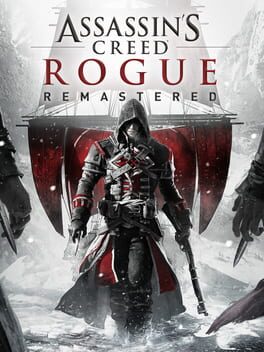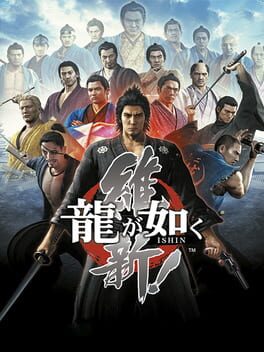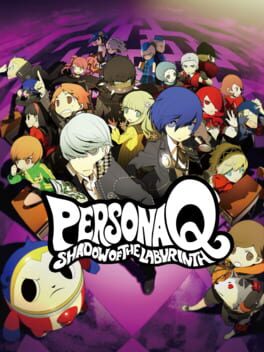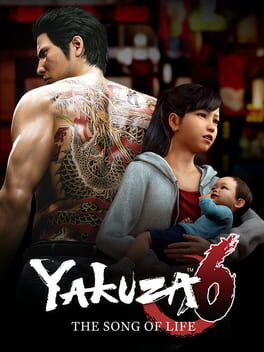IggyWalk
It's more Black Flag but with a disappointing narrative and characters. Assassin's Creed has never had the most interesting of stories, but Rogue managed to frustrate the most. The inciting event that kicks off the main plot feels very forced, and everytime the story has a chance to add nuance to the conflict between the Assassins and Templars, it squanders it. Adewale was wasted on this game.
If anyone reading this is interested in trying the original Ishin with the old cast and gameplay, I highly recommend this guide by KHHSubs: https://www.tumblr.com/khhsubs/92228717296/ishin-guide-in-pdf-format
It has everything you need to not only complete the main story, but even 100% complete the game (though I wouldn't recommend it if you don't want to sour your experience).
Moving on, yeah Ishin is pretty great. It has to be one of the most fun gameplay experiences I've had with the series. I was kind of concerned that the Wild Dance style would absolutely overshadow the other styles, but I'm happy to say that's not the case. All the styles are fun to use and they all feel distinct from one another. Though, if I had to choose a favorite.. yeah I'd have to go with Wild Dance. It just feels so good to "dance" around your enemies and deliver a mix of sword slashes and gunshots.
There's also a few changes to the mechanics that I feel are worth pointing out. Since this game revolves around guns and swords, crafting is pretty much essential now. This is something I was kind of concerned about due to hearing from other people that Ishin has a grinding problem. However, I was pleasantly surprised to find out that the grind really isn't that bad, so long as you don't approach it with a completionist mindset. This even brought some positive changes to the crafting system, such as the fact that secondary weapons no longer break like in the other games, so you can use them freely.
A bit of advice; examine every pot and well you come across when exploring and moving around town. So long as you do that, you should be able to upgrade your weapons at least twice. For further ugrades, there's the battle dungeons. You get plenty of materials there much faster, and they don't take long to clear. Though honestly, I wouldn't recommend bothering with weapons above 6 stars, unless you want to become overpowered (or if you want to complete the optional battle arena).
I have to say though, if there's one change I am not a fan of, it's the fact that you need to spend skill points on the skills you learn from the masters if you actually want to use them. That's the only grinding in the game that truly bothered me.
Unfortunately, I can't really talk much about the story for obvious reasons. I mean, I do know what the plot is (thanks to the guide I linked above), and I can say that there's some pretty good plot twists and hype as shit moments in there. But sadly, the majority of the writing, such as characterization, was totally lost on me. This is something I won't really be able to appreciate until the upcoming remake releases, same goes for the vast majority of the substories. However, what I can definitely praise are the excellent boss fights and action set pieces this game has to offer. The final stage in particular is amazing, it's easily one of my new favorites in the series, and I can't wait for more people to experience it.
While I can't say much about the quality of the side content's writing, it's still pretty fun. The most wanted missions were fun distractions, and the minigames I experienced were very enjoyable. This game's interation of the karaoke has got to be one of my favorites in the series so far, and the fan dancing is another favorite.
Anyways yeah Ishin good. I really look forward to comparing this with the upcoming remake, and see which one I like more. I also might update my score once I fully experience the story in english.
It has everything you need to not only complete the main story, but even 100% complete the game (though I wouldn't recommend it if you don't want to sour your experience).
Moving on, yeah Ishin is pretty great. It has to be one of the most fun gameplay experiences I've had with the series. I was kind of concerned that the Wild Dance style would absolutely overshadow the other styles, but I'm happy to say that's not the case. All the styles are fun to use and they all feel distinct from one another. Though, if I had to choose a favorite.. yeah I'd have to go with Wild Dance. It just feels so good to "dance" around your enemies and deliver a mix of sword slashes and gunshots.
There's also a few changes to the mechanics that I feel are worth pointing out. Since this game revolves around guns and swords, crafting is pretty much essential now. This is something I was kind of concerned about due to hearing from other people that Ishin has a grinding problem. However, I was pleasantly surprised to find out that the grind really isn't that bad, so long as you don't approach it with a completionist mindset. This even brought some positive changes to the crafting system, such as the fact that secondary weapons no longer break like in the other games, so you can use them freely.
A bit of advice; examine every pot and well you come across when exploring and moving around town. So long as you do that, you should be able to upgrade your weapons at least twice. For further ugrades, there's the battle dungeons. You get plenty of materials there much faster, and they don't take long to clear. Though honestly, I wouldn't recommend bothering with weapons above 6 stars, unless you want to become overpowered (or if you want to complete the optional battle arena).
I have to say though, if there's one change I am not a fan of, it's the fact that you need to spend skill points on the skills you learn from the masters if you actually want to use them. That's the only grinding in the game that truly bothered me.
Unfortunately, I can't really talk much about the story for obvious reasons. I mean, I do know what the plot is (thanks to the guide I linked above), and I can say that there's some pretty good plot twists and hype as shit moments in there. But sadly, the majority of the writing, such as characterization, was totally lost on me. This is something I won't really be able to appreciate until the upcoming remake releases, same goes for the vast majority of the substories. However, what I can definitely praise are the excellent boss fights and action set pieces this game has to offer. The final stage in particular is amazing, it's easily one of my new favorites in the series, and I can't wait for more people to experience it.
While I can't say much about the quality of the side content's writing, it's still pretty fun. The most wanted missions were fun distractions, and the minigames I experienced were very enjoyable. This game's interation of the karaoke has got to be one of my favorites in the series so far, and the fan dancing is another favorite.
Anyways yeah Ishin good. I really look forward to comparing this with the upcoming remake, and see which one I like more. I also might update my score once I fully experience the story in english.
It's been years since I last played this game, and it's only until now that I've decided to stop pretending that I'll ever come back to it.
This game is... fine. It plays decent, the visuals are charming, and the characterization (of some) of the characters is fun, that's as far as my praise goes. Q's dungeons go on for waay too long, and they're full of gimmicky mini-bosses that stop being fun to deal with halfway through the second dungeon. The story is pretty uninteresting, the new characters are incredibly bland too, and to make things worse, the pace in which the story progresses is slow as molasses. But what about the character interactions? After all, the point of this game is to watch the casts of P3 and P4 interact, right? Well... they're kind of a mixed bag. Like I mentioned earlier, the characterization of SOME of the legacy characters is fun, but the ones they don't get right are either tiresome or just awful. Teddie has got to be the worst offender, I wanted him gone any time he'd show up on screen, he's by far the worst written character in Q, and he was already my least favorite member of the Investigation team.
I wouldn't call Persona Q a bad game, but I have no desire to return to it whatsoever. I hear Persona Q2 is much better at least.
This game is... fine. It plays decent, the visuals are charming, and the characterization (of some) of the characters is fun, that's as far as my praise goes. Q's dungeons go on for waay too long, and they're full of gimmicky mini-bosses that stop being fun to deal with halfway through the second dungeon. The story is pretty uninteresting, the new characters are incredibly bland too, and to make things worse, the pace in which the story progresses is slow as molasses. But what about the character interactions? After all, the point of this game is to watch the casts of P3 and P4 interact, right? Well... they're kind of a mixed bag. Like I mentioned earlier, the characterization of SOME of the legacy characters is fun, but the ones they don't get right are either tiresome or just awful. Teddie has got to be the worst offender, I wanted him gone any time he'd show up on screen, he's by far the worst written character in Q, and he was already my least favorite member of the Investigation team.
I wouldn't call Persona Q a bad game, but I have no desire to return to it whatsoever. I hear Persona Q2 is much better at least.
I don't see Yakuza 6 as a good conclusion to Kiryu's story. It's kind of a character regression, and the way the game gets there feels a bit forced. It ignores past character arcs to conclude on the same spot he was at the start of the previous game, and while it does deliver some excellent moments, it overall isn't satisfying enough in my opinion. Kiryu's legacy is also barely touched upon. Most of his relationships didn't get any closure, which was such a weird decision for a game like this.
The move to a new engine also brought a couple of gameplay-related problems. The combat, for one, took a little bit of a dive in quality, which was disappointing for the (at the time) last entry with Kiryu as the lead. However, the series has progressed a lot since then, and now that we know that it's no longer the last chapter in Kiryu's story, it's fun to look back on Yakuza 6 as the first Dragon Engine game, and see how things have evolved since.
To end on a more happy note, I'll list some of my positive thoughts about the game:
- The entire game having voice acting is great, it really added some extra life to the substories. Shoutouts to those kids clearly being voiced by adults in the first Onomichio substory.
- Speaking of substories, this game has some great ones to offer. Onomichio is one of the best running jokes in the series.
- Goes without saying but Dragon Engine looks amazing even early on, especially during nighttime.
- The soundtrack fucking rules, Destiny and Theory of Beauty are the highlights for me.
- Someya is the best rival in the game easily, has the best boss fights too.
- Joon-Gi Han is not as good as Someya but he's really fun whenever he's on screen so he gets a mention.
- Nagumo is actually pretty funny, I like him a lot.
- Hirose's backstory is great and the only time Kurusu felt like a real character.
- Tsuneo is one of the weaker villians in the series, but I like his thematic relevance to the plot, and he does a great job at making you want to destroy him.
- Despite writting Haruka out for most of the narrative, Yakuza 6 still manages to explore the theme of Parenthood real nicely, in great part due to the new characters introduced.
- Yuta is actually not bad, which was a pleasant surprise.
- The dungeons & set pieces are pretty good, some of my favorites too such as the hotel raid.
- The karaoke is improved and darts is finally playable.
- Despite the small size, I really appreciate Onomichi for having such a different vibe compared to the other cities in the series.
- Despite how harshly I criticized the ending of this game, it does deliver one scene that I really love; the letter.
The move to a new engine also brought a couple of gameplay-related problems. The combat, for one, took a little bit of a dive in quality, which was disappointing for the (at the time) last entry with Kiryu as the lead. However, the series has progressed a lot since then, and now that we know that it's no longer the last chapter in Kiryu's story, it's fun to look back on Yakuza 6 as the first Dragon Engine game, and see how things have evolved since.
To end on a more happy note, I'll list some of my positive thoughts about the game:
- The entire game having voice acting is great, it really added some extra life to the substories. Shoutouts to those kids clearly being voiced by adults in the first Onomichio substory.
- Speaking of substories, this game has some great ones to offer. Onomichio is one of the best running jokes in the series.
- Goes without saying but Dragon Engine looks amazing even early on, especially during nighttime.
- The soundtrack fucking rules, Destiny and Theory of Beauty are the highlights for me.
- Someya is the best rival in the game easily, has the best boss fights too.
- Joon-Gi Han is not as good as Someya but he's really fun whenever he's on screen so he gets a mention.
- Nagumo is actually pretty funny, I like him a lot.
- Hirose's backstory is great and the only time Kurusu felt like a real character.
- Tsuneo is one of the weaker villians in the series, but I like his thematic relevance to the plot, and he does a great job at making you want to destroy him.
- Despite writting Haruka out for most of the narrative, Yakuza 6 still manages to explore the theme of Parenthood real nicely, in great part due to the new characters introduced.
- Yuta is actually not bad, which was a pleasant surprise.
- The dungeons & set pieces are pretty good, some of my favorites too such as the hotel raid.
- The karaoke is improved and darts is finally playable.
- Despite the small size, I really appreciate Onomichi for having such a different vibe compared to the other cities in the series.
- Despite how harshly I criticized the ending of this game, it does deliver one scene that I really love; the letter.




